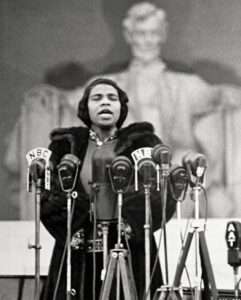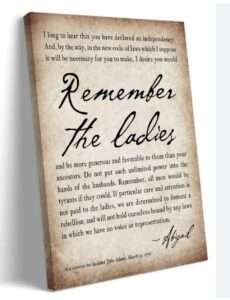By Carol Fisher-Linn
Imagine this: when this democracy was first established, women were considered property of men. They were silenced, discriminated against, and deprived of their civil rights. You might claim that today the 14th Amendment, ratified in 1868, promises all citizens “equal protection of the laws.” It does not.
In March, we honor courageous women in history who have ignored the shackles, stepped out of the mold, gone against the norm, and have fought not only for the rights of other women but for all people. In the early 20th century, women were mostly barred from the political arena, yet many of unelected and unpaid First Ladies advanced critical causes for Americans. In 1838 women began the fight to vote – it finally happened in 1920! Despite the impediments, many First Ladies found their power and influence, and were unafraid to use it. As the public began to recognize the role of the First Ladies, these women became some of the country’s first “social influencers.”

Abigail Adams (John Adams 1797-1801), even before she served as First Lady was famous (and publicly scolded) for her advocacy of women’s rights, female education, and the abolition of slavery. She didn’t mince words and passionately supported independence – looking for equality for women as well. During the Second Continental Congress she wrote to her husband and Founding Father, John Adams, reminding him: “And, by the way, in the New Code of Laws … I desire you would Remember the Ladies, and be more generous and favourable to them than your ancestors … Remember all Men would be tyrants if they could. If particular attention is not paid to the Ladies we are determined to foment a Rebellion, and will not hold ourselves bound by any Laws in which we have no Voice, or Representation.” Even when Adams pushed back, she made clear she was serious.

she served as First Lady was famous (and publicly
scolded) for her advocacy of women’s rights, female
education, and the abolition of slavery.
In National Geographic we find a plethora about First Ladies who served as “influencers.” Sarah Polk (James K. Polk 1845-1849) wrote speeches for her husband and even gave him advice on important political matters. Polk wrote about her, “She was politician, counselor, nurse and emotional resource.”
In 1919, Edith Wilson played an unexpected role after Woodrow Wilson (1913-1921), had a stroke and brain injury that incapacitated him (Oct. 19, 1919). Although the vice president should normally take over for a sick president, it was determined that the stress would make Wilson sicker. It was decided that the Mrs. Wilson would secretly step in for the president. She managed all his daily affairs and helped run the government until Wilson left office in March 1921.
Eleanor Roosevelt, First Lady to President Franklin D. Roosevelt (1933-1945), used her influence to bring change. Post-Great Depression, Eleanor Roosevelt visited some of the poorest areas in the country to talk to citizens and bring their stories to her husband. Roosevelt’s New Deal included many job and housing programs for struggling citizens thanks to Eleanor’s travels, radio speeches, newspaper articles and conversations with the American people and reporters. A champion of racial equality, Mrs. Roosevelt invited Marion Anderson to sing at the Lincoln Memorial after the DAR refused to have her sing at their concert hall because she was black. Oh, yes, she also quit the DAR!
Mamie Eisenhower invited black children to the White House’s annual Easter Egg Roll when she realized they were not invited. Lady Bird Johnson encouraged LBJ to pass the Civil Rights Act and spoke out in public hoping to change people’s minds because she was a southerner. Instead, she initially received threats, yet was ultimately credited for LBJ’s re-election. Laura Bush raised the country’s awareness for reading and Michelle Obama encouraged healthier eating and exercise habits for children. Betty Ford championed women’s rights and campaigned for the ERA. Roslyn Carter attended cabinet meetings and briefings with her husband, where she was involved in policy issues. Hillary Clinton led a task force to create an improved health care program for all Americans. Some people did not want the First Ladies in the forefront. They sent angry letters and lawmakers pushed back telling Mrs. Carter to stay at home and claimed that Hillary overstepped her place. They continue to keep on.
First Ladies continue to make their mark on American history. Because of them and intrepid, relentless women leaders like them all over America throughout our history, glass ceilings are being shattered, and today, women make up just over a quarter of all members of the 117th Congress – the highest percentage in U.S. history and a considerable increase from where things stood even a decade ago. Women are on the move. Let’s join, or step aside. There is work to be done.
